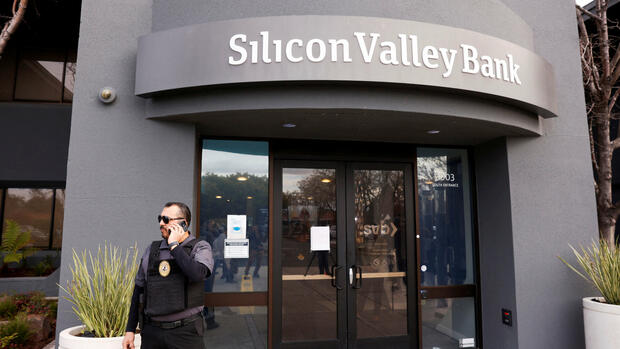Silicon Valley Bank was less regulated than the big Wall Street banks.
(Photo: Reuters)
Frankfurt For the first time since the bankruptcy of the American Silicon Valley Bank and the emergency merger of Credit Suisse with the major Swiss bank UBS, the two most important international standard-setters for banks have taken a position on the turbulence caused by this. Both criticized the way legislators in the European Union and the USA implemented the banking reforms after the great financial crisis of 2008, some diplomatically, some relatively openly.
Klaas Knot, who chairs the Financial Stability Board, wrote to G20 finance ministers and central bank governors: “Unlike other recent shocks, this latest episode had its roots in the financial system. It is therefore all the more necessary that financial regulators learn from this and act accordingly.”
The Financial Stability Board is an international body that coordinates the work on the supervision and regulation of the international financial markets and to which the central banks, supervisory authorities and finance ministries of the 20 most important industrialized nations belong.
From the point of view of Knot, who is also governor of the Dutch central bank, the reform proposals that the international community agreed on after the financial crisis have proven their worth despite the turbulence. “Without these reforms, the stress experienced by some individual banks could have spread to other parts of the financial system.”
Knot’s reference to the need to implement the internationally agreed reforms is an indirect criticism of lawmakers around the world. Because the regulations for market price risks, which are intended to make dealing with capital market turbulence more conservative, have not yet been implemented.
This comment is also likely to be a criticism of the European Union, which has still not fully implemented the banking reforms passed in 2017, known in technical jargon as Basel III and Basel IV. The last reform work is currently being negotiated between the EU Commission, EU Council and EU Parliament in a trilogue process. Some of the agreements deviate significantly from the original reform proposals.
Basel Committee chair criticizes US
Pablo Hernández de Cos, chairman of the Basel Committee on Banking Supervision, warned that the risks of high inflation, slower growth and geopolitical tensions are as relevant today as they were at the beginning of March. In mid-March, the Silicon Valley Bank went under because of poorly managed interest rate risks, and a week later Credit Suisse was taken over by UBS.
In a speech in Washington, the governor of the Spanish central bank also criticized the United States. It is okay that the Basel reforms are only applied to internationally active banks and that there are reliefs for banks that are not internationally active. However, the Basel Banking Committee has always emphasized that it is important to align the extent of a bank’s monitoring with its risk profile and systemic importance.
“Recent events remind us that there are many dimensions to the systemic importance of a bank failure, including first- and second-round effects,” said Hernández de Cos.
>>> Also read: Concerns about US regional banks are growing
Silicon Valley Bank was less regulated than the big Wall Street banks. Under the administration of President Donald Trump, the US government had exempted so-called medium-sized banks – institutions with a balance sheet volume of up to 250 billion US dollars – from important liquidity regulations. The same was true of Silicon Valley Bank, whose total assets were $210 billion. The Californian institute was only declared a systemically important bank when it went bankrupt in order to be able to save it.
The Basel Banking Committee has always said that proportionality considerations should not be used “to dilute the robustness of standards” and that any simplification of rules for smaller banks must be accompanied by being more conservative. This is not the case in the US: smaller banks – which currently includes banks with total assets of up to $250 billion – are exempt from these regulations.
In contrast, all banks in the European Union must first follow the internationally agreed Basel regulations. The institutes are exempt from some particularly complex rules, but the substitute rules that apply to them are more conservative.
More: Bank supervisor Campa: “No crisis is like the other”
